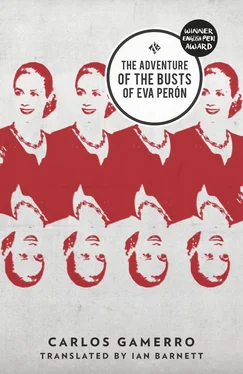‘So you’re out of a job again, are you?’
‘But I wasn’t fired this time, Pipota. I was on strike.’
‘How long d’you last this time? Twenty days? What did I tell you? Bet you don’t see the end of the month out.’
‘Listen ’ere, old girl… we was fucked. Several of the comrades pegged out. I got out of there by a sheer fluke.’
‘All right, keep your shirt on. We’ll get by on the milanesa butties. I’ll make another batch straight off, now you’re back to lug the basket around. What about me laddo in there, who’s he? Got to put grub on his plate, too, have I?’
At this point El Tuerto’s voice had fallen to a whisper, and his wife must have been suitably impressed because she had answered in the same hushed tones. Marroné also remembered feeling a rather mean-minded relief at overhearing his hosts’ conversation. All the women he had met during the strike were self-sacrificing proletarians who put their shoulders to the wheel, took whatever came their way and supported, not to say encouraged, their husbands’ bravery — and all without a word of complaint. Of course, he’d only met the ones who had visited the factory. There were also, he now realised, women who stayed at home, cursing and muttering as they fried their poisoned milanesas .
Moving delicately and feeling as fragile as a limb just out of a cast, he’d sat down to get changed on the bed, which was so high (each leg stood on three bricks) that his feet didn’t reach the floor; the next thing he remembered was a hand slapping him gently to bring him round from his comatose slumber.
‘Ernesto… Ernesto… There’s some people ’ere as wants to see you,’ El Tuerto told him.
There were three of them. The first, between forty and forty-five, was tall, dark-skinned, mono-browed, sunken-eyed; he wore bell-bottoms — from under which peeped the toes of moccasins — and a short-sleeved safari shirt, and smoked super-king-size, which he pulled out of one or other countless pockets weighed down with buckles; he was backed up by a hulk with long hair and a moustache, wearing a tight-fitting, flesh-coloured polo neck and towelling wrist- and head-bands, as if he’d just dropped in after a game of tennis; and a lad who couldn’t have been more than twenty, in a shimmering brown velvet jacket, the crease in his immaculate white trousers ironed sharp as a knife, and whose unruly quiff had been slicked back into a roof of corrugated iron. They shook hands very formally: Sr Gareca, Malito and El Bebe. El Tuerto had brought them all chairs, but had parked himself on an upended orange crate; he poured them a glass of unchilled white wine from a bottle without a label and sent the girls into the other room; La Pipota, meanwhile, went on with her milanesas , filling the scant breathing space with a choking fog of burnt oil and kerosene.
Sr Gareca had opened by acknowledging their achievements in the shanties and had thanked them for their contributions of cider and panettone on Christmas Eve, then gone on to explain how they’d do their best to pay them back (‘You scratch our backs…’), even if they did lack the wherewithal. But then, the mutual return of favours aside, one thing was clear: they all had the same interests at heart, like dragging the poor out of their poverty (here La Pipota, who, with snorts of disbelief and exaggerated gesticulations, provided a running commentary on all she heard, had said — as if to herself, but out loud for all to hear — ‘Yeah, right, just as long as them ’s the poor,’ and her husband flashed her a withering glare with his white eye, which, like one of those purple rings you buy at the seaside, seemed to change colour with his mood). They shared the same enemy, Sr Gareca had continued, not letting on he’d heard a thing, and then, after all, they were all Peronists, weren’t they. At this point Malito had whispered something in his ear, and Sr Gareca had muttered back through clenched teeth, ‘Not now, wait a bit.’ Up till now, Sr Gareca resumed his introduction, they’d been getting along famously, ‘All for one and one for all’ as they say; whenever the need had arisen, they’d helped each other out, and if there had ever been any friction, or the odd misunderstanding, they had worked things out with goodwill ‘and above all respect’. He spoke carefully, choosing his words and using them painstakingly to construct his sentences, which he invariably ended with an ‘Am I making sense?’, to which Marroné would invariably reply with bouts of vehement nodding, though he understood less and less of what was said. Satisfied, Sr Gareca had paused, lit up another super-king-size, let out the smoke and set off again with a ‘The fact is…’ that had sounded promising but he soon lapsed back into his circuitous progress through the chaff without ever reaching the wheat: things, it seemed, had changed; now they could no longer each tend to their own little patch; the time had come to join forces and think big. ‘He wants to do business with the company,’ Marroné had told himself, beginning to join the dots: since Sr Tamerlán’s kidnapping they’d been dishing out food in the shanties like there was no tomorrow; in fact, he himself as head of procurement had been responsible for finding the cheapest fare, and it made perfect sense for the panettone and cider he’d ordered to end up here in this shanty town; what made no sense at all was that the very same shanty housed a company that wanted to do business with Tamerlán & Sons, and that someone like Sr Gareca was its owner or CEO. Unless, of course, it was all about sanitary landfill, which made quite a lot of sense, especially if it involved buying the land for a song and bulldozing the shanties to push its value up; Sr Tamerlán had made many such an investment. ‘The fact is we’ve got the people, we’ve got the territory and we’ve got the experience; I won’t bore you with all the details, but right here in the area we’ve done two factories, a hospital and a lumberyard…’ Oh, so this was another construction company then, and what Sr Gareca was proposing was a merger. So the rumours going round were true: far from being kennels for slumdogs, dark shores where the jetsam from the city’s churning wake washed up, the shanties were miniature republics, underdeveloped versions of those European principalities that flourish away from the asphyxiating regulations that hold back the economies of the big republics. As rumour had it, the shanties were a vast black market, an archipelago of miniature duty-free zones, like the tax havens of the Caribbean, amidst an ocean of asphalt and cement. They had everything; everything was bought and everything was sold: what you couldn’t find elsewhere you could buy here, and Marroné made a mental note to ask about those disposable nappies. These true clandestine industrial parks were home to textile firms, furniture factories, bottling plants that filled brand-name bottles with foul substances, slaughterhouses for contaminated animals and travel agents that organised package holidays back home for illegal immigrants. He’d heard all this before but had dismissed it more often than not as fantasy and exaggeration. And now he had the tangible proof before his very eyes: one of these entrepreneurs, who had, by dodging the taxman, entered the fray with the lowest prices and made an astronomical killing, was daring to speak with one of the giants of the field as an equal.
‘Don’t forget the pharmacy,’ the young man in the velvet jacket had chipped in at one point, and Sr Gareca included it forthwith in his oral curriculum. The ever-obliging El Tuerto went around attentively refilling their glasses, while his wife went on frying her milanesas , and every one she tossed on the growing stack was accompanied by a barbed sideswipe: ‘Oh. Right. The lefties gang up with the pimps and we’re saved!’
Читать дальше











